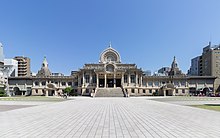Tsukiji Station
H11 Tsukiji Station 築地駅 | |||||||||||
|---|---|---|---|---|---|---|---|---|---|---|---|
 Exit1, August 2019 | |||||||||||
| General information | |||||||||||
| Location | 3-15-1 Tsukiji, Chūō, Tokyo (東京都中央区築地3-15-1) Japan | ||||||||||
| Operated by | |||||||||||
| Line(s) | H Hibiya Line | ||||||||||
| Connections | Y20 Shintomichō | ||||||||||
| Construction | |||||||||||
| Structure type | Underground | ||||||||||
| Other information | |||||||||||
| Station code | H-11 | ||||||||||
| History | |||||||||||
| Opened | 28 February 1963 | ||||||||||
| Services | |||||||||||
| |||||||||||
Tsukiji Station (築地駅, Tsukiji-eki) is a subway station on the Tokyo Metro Hibiya Line in Tsukiji, Chūō, Tokyo, Japan, operated by the Tokyo subway operator Tokyo Metro.
Lines
Tsukiji Station is served by the Hibiya Line, and is numbered H-11. It is located 10.7 km from the starting point of the line at Kita-Senju.[1]
Station layout
Tsukiji station has a simple side platform arrangement with two tracks. Platform 1 serves southbound trains to Ginza, whilst platform 2 serves northbound trains to Ueno and Kita-Senju.
Access to the station is provided by two sets of entrances and exits, with a total of four points of entry in total. Exits 1 and 2 are on opposite sides of Route 50 at the southern end of the station near the fish market. Exits 3 and 4 are also on opposite sides of the same road but at the northern end of the station.
Platforms
| 1 | H Hibiya Line | for Ginza, Roppongi, and Naka-Meguro |
| 2 | H Hibiya Line | for Ueno, Kita-Senju TS Tobu Skytree Line for Tōbu-Dōbutsu-Kōen TN Tobu Nikko Line for Minami-Kurihashi |
- Ticketing machines
- Platforms
History
Tsukiji Station opened on 28 February 1963.[1]
The station facilities were inherited by Tokyo Metro after the privatization of the Teito Rapid Transit Authority (TRTA) in 2004.[2]
Surrounding area

- Shintomichō Station (
 Tokyo Metro Yurakucho Line) (approximately 2 minutes' walk)
Tokyo Metro Yurakucho Line) (approximately 2 minutes' walk)
The station is located in the Tsukiji neighbourhood of Chūō, Tokyo. Only a few blocks south of the station (about 150 m) lies Tsukiji fish market, the largest seafood market in the world.[3] On the eastern side of the station is the Tsukiji Hongan-ji, a pilgrimage site for Buddhists worldwide.
References
- ^ a b Terada, Hirokazu (19 January 2013). データブック日本の私鉄 [Databook: Japan's Private Railways]. Japan: Neko Publishing. p. 215. ISBN 978-4-7770-1336-4.
- ^ "「営団地下鉄」から「東京メトロ」へ" [From "Teito Rapid Transit Authority" to "Tokyo Metro"]. Tokyo Metro Online (in Japanese). 2006-07-08. Archived from the original on 16 May 2012. Retrieved 29 May 2022.
- ^ Guide to sightseeing Tokyo Metro Retrieved 18 January 2009
External links
- Tokyo Metro station information (in Japanese)

